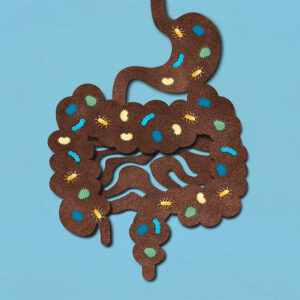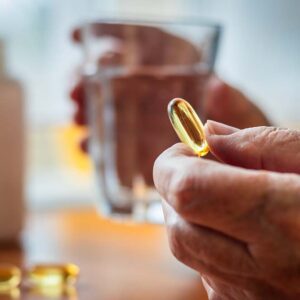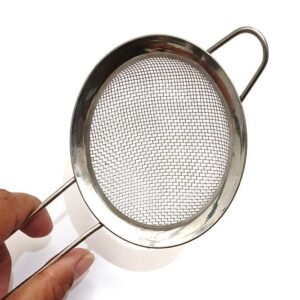
"SKIP" Atrial Fibrillation with 3 Heart Hacks
Atrial fibrillation (A-fib) can be as uncomfortable as it is dangerous.
Feeling those heart palpitations or flutters in your heart is downright nerve-wracking, to begin with. But then, knowing that you could suffer a sudden, deadly blood clot can send your anxiety right through the roof.
The mainstream approach to treating the disease is either cardioversion, which literally stops your heart and shocks it back into rhythm, OR an invasive surgery.
And sadly, neither is typically a permanent fix.
But if you’re at risk for A-fib, some SIMPLE heart hacks could help you dodge the condition.
Atrial fibrillation (A-fib) is a common disorder. It causes the upper part of the heart (the atria) to beat irregularly.
If you’re a senior, you’re at a higher risk. But it can strike folks at any age.
A-fib can make you feel fatigued. And an irregular heartbeat can cause blood to pool in the heart, raising your risk for blood clots, strokes, and heart attacks.
Like most heart-linked conditions, maintaining healthy blood pressure and managing weight can reduce your chance of developing atrial fibrillation.
But that’s not ALL you can do. The following are three PROVEN hacks to dial down your A-fib risk.
- Slash Stress: Research shows that stress increases your risk for atrial fibrillation. So one of the first (and best) steps you can take to slash your A-fib risk is to REDUCE your stress.
You can start by getting better, quality sleep and using relaxation techniques like deep breathing, prayer, or meditation. Quit smoking, drinking alcohol, and stop consuming too much caffeine—all of which can increase your stress.
Then try MY favorite stress-reducing trick… take a “nature pill.” Also known as “vitamin O” (for outdoors), spending some time outside in nature has literally been PROVEN to reduce stress.
Something remarkable happened when researchers had three dozen volunteers spend a few extra minutes outdoors three times a week. Just 20 minutes in nature made their stress and cortisol (stress hormone) levels plummet.
- Exercise: If you aren’t already exercising, it’s time to start. Research shows it has a direct impact on A-fib risk.
In a six-month study, folks who regularly exercised (supervised AND unsupervised moderate exercise) experienced far fewer atrial fibrillation episodes.
Plus, the attacks they did have were significantly less severe.
But most remarkable of all was that, in some cases, the A-fib disappeared entirely. A closer look reveals a few likely reasons WHY it worked.
Exercise demolishes stress (a known A-fib risk factor), to begin with. Plus, the researchers reported the volunteers lost weight, lowered their blood pressure, and slept better.
Pick an exercise you enjoy and that isn’t too strenuous, such as walking, swimming, cycling, or golfing. The key is to do it consistently.
- Vitamin D: Recent research revealed vitamin D can be a potent tool in the fight against A-fib.
D affects the heartbeat by encouraging the absorption of calcium. And calcium, in turn, helps generate electrical impulses and muscle contractions that regulate heartbeat.
When researchers gave volunteers high doses of vitamin D daily, their A-fib risk plummeted. After four years, folks taking 40 micrograms had a 27 percent lower risk of an irregular heartbeat, and those taking 80 had a 32 percent lower risk.
Your best defense against atrial fibrillation is to avoid those heart palpitations in the first place. These three heart hacks could help you do just that.
P.S. Recent research reveals another powerful, drug-free tool that could help you dodge A-fib. And believe it or not, you can pick it up at your local grocery store. CLICK HERE for the details.
Source:
“Heart Disease: Atrial Fibrillation,” Centers for Disease Control and Intervention, cdc. gov
Written By Dr. Scott Olson, ND
Nearly 25 years ago, failed mainstream medical treatments left Dr. Olson in constant pain – and his health in ruins. And that’s when he did something REVOLUTIONARY. He began his career in medicine – and dedicated his life to uncovering the true, underlying causes of disease.
Through his innovative medical practices in Tennessee and Colorado, Dr. Olson has helped cure countless seniors from across America of arthritis… heart disease… diabetes… and even cancer. All without risky prescription drugs or painful surgeries.
View More Free Articles
The Hidden Dangers of Fried Foods
It’s no wonder French fries are so popular. They’re crispy, salty, and oh-so-satisfying. As a matter of fact, as I wrote the words “crispy” and “salty” just now, my mouth watered. I’m only human, after all. But brace yourself—because what I’m about to share will make you think twice before diving into your next serving...
Losing Your Locks? The SURPRISING Solution
There’s no way to sugarcoat it. Losing your hair sucks. The hit to your self-esteem is no joke. You might even find yourself avoiding mirrors and hoarding hats. The treatment options are limited, often come with a laundry list of side effects, and deliver results that are about as predictable as a coin flip. It’s...
REAL Drug-Free Back Pain Relief
Recently, I’ve had several exasperated people ask me, “Is back pain something I just have to live with?” I battled chronic back pain for years, so I completely understand why some folks feel so hopeless about finding relief. In fact, I used to think I was doomed to a life of pain and limitations, too....
Mailbag: When to Worry About Memory Lapses
“I’ve been experiencing some memory lapses recently, and I’m worried it might be early signs of Alzheimer’s disease. My mother also had it. What symptoms should I look out for?” – Ann Hi Ann, It’s important to recognize that some degree of memory loss is a normal part of life. Our brains constantly process and...
The Unforeseen Link Between Your Gut and Your Waistline
As the weather warms up and summer approaches, many of us start thinking about shedding those extra pounds… We dust off our gym memberships, stock up on salad greens, and vow to finally fit into those shorts from last year. But what if I told you that the key to achieving a healthy weight might...
Defy Aging with the Sunshine Vitamin
If there’s one thing you absolutely must do for your health, it’s to maintain healthy vitamin D levels. I can’t stress this enough. And if you think vitamin D is only good for beefing up your bones, think again. Because while vitamin D is crucial for maintaining healthy bones, recent research has revealed that this...
Detox Your Drinking Water with a Microplastics Purge
We’re surrounded by plastics. They’re everywhere, from the obvious plastic shampoo bottle to the not-so-obvious clothing on our backs. From the moment we get up in the morning until we slide beneath the sheets at night, we are in contact with them. Heck, some bedsheets contain plastic fibers, so you may ALSO be exposed while...
The TRUTH About Word Finding Troubles
Picture this. You’re having a lively conversation with a friend, and suddenly, find yourself grasping for a word that’s just out of reach. You KNOW it’s in there somewhere, hiding in the recesses of your mind. But no matter how hard you try, you can’t seem to pin it down. When you have trouble word...
FDA Finally Admits “BANNED” Soda Ingredient is Unsafe
I’m not a soda fan for MANY reasons. I wrote an entire book on the dangers of sugar, for example. And research links soda drinking to fatty liver disease, heart disease, high blood pressure, diabetes, obesity, and Alzheimer’s. And the diet stuff is no better. Fake-sugar-filled diet sodas cause “metabolic confusion,” and artificial sweeteners are...
Discover WHY We Accidentally Overeat (and How to Stop)
Picture this… You finish eating a nice meal feeling just fine. But then, 20 minutes later, you’re groaning and clutching your belly because you feel uncomfortably stuffed. If this sounds familiar, you’re in good company. Most of us have had this happen. Science reveals why accidental overeating occurs… and what we can do to avoid...









